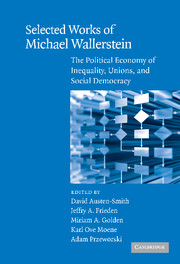 Selected Works of Michael Wallerstein
Selected Works of Michael Wallerstein Book contents
- Frontmatter
- Contents
- Preface and Acknowledgments
- 1 GENERAL INTRODUCTION
- Part I Class Conflict, the State, and Economic Limits to Democracy
- Part II The Politics of Labor Organizations
- Part III Inequality and Redistribution
- 11 INTRODUCTION
- 12 WAGE-SETTING INSTITUTIONS AND PAY INEQUALITY IN ADVANCED INDUSTRIAL SOCIETIES
- 13 INEQUALITY, SOCIAL INSURANCE, AND REDISTRIBUTION
- 14 REDISTRIBUTION AND AFFIRMATIVE ACTION
- Part IV Labor and the Nordic Model of Social Democracy
- Other Books in the Series
- References
14 - REDISTRIBUTION AND AFFIRMATIVE ACTION
Published online by Cambridge University Press: 27 January 2010
- Frontmatter
- Contents
- Preface and Acknowledgments
- 1 GENERAL INTRODUCTION
- Part I Class Conflict, the State, and Economic Limits to Democracy
- Part II The Politics of Labor Organizations
- Part III Inequality and Redistribution
- 11 INTRODUCTION
- 12 WAGE-SETTING INSTITUTIONS AND PAY INEQUALITY IN ADVANCED INDUSTRIAL SOCIETIES
- 13 INEQUALITY, SOCIAL INSURANCE, AND REDISTRIBUTION
- 14 REDISTRIBUTION AND AFFIRMATIVE ACTION
- Part IV Labor and the Nordic Model of Social Democracy
- Other Books in the Series
- References
Summary
Introduction
Many scholars have observed that the politics of redistribution in the US is intertwined with the politics of race. Writing in the 1950s, Lipset and Bendix (1959) argued that the “social and economic cleavage” created by discrimination against blacks and Hispanics “diminishes the chances for the development of solidarity along class lines” (1959: 106). Myrdal (1960), Quadagno (1994) and, most recently, Gilens (1999) claim that racial animosity in the US is the single most important reason for the limited growth of welfare expenditures in the US relative to the nations of Western Europe. According to Quadagno (1994), political support for Johnson's War on Poverty was undermined by the racial conflicts that erupted over job training and housing programs. Alesina et al. (1999) find that localities in the US with high levels of racial fragmentation redistribute less and provide fewer public goods than localities that are racially homogeneous. Alesina and Glaeser (2004) conclude that racial conflict is one of the most important reasons for the low level of redistribution in the US compared to Europe.
The dominant approach in studies of race and redistributive politics in the US is to focus on the manner in which race affects voters' preferences regarding redistributive policies. Kinder and Sanders (1996) and Alesina and La Ferrara (2000) find that the sharpest contrast in preferences for redistributive policies in the US today is not between rich and poor or between men and women, but between whites and blacks.
- Type
- Chapter
- Information
- Selected Works of Michael WallersteinThe Political Economy of Inequality, Unions, and Social Democracy, pp. 320 - 366Publisher: Cambridge University PressPrint publication year: 2008


